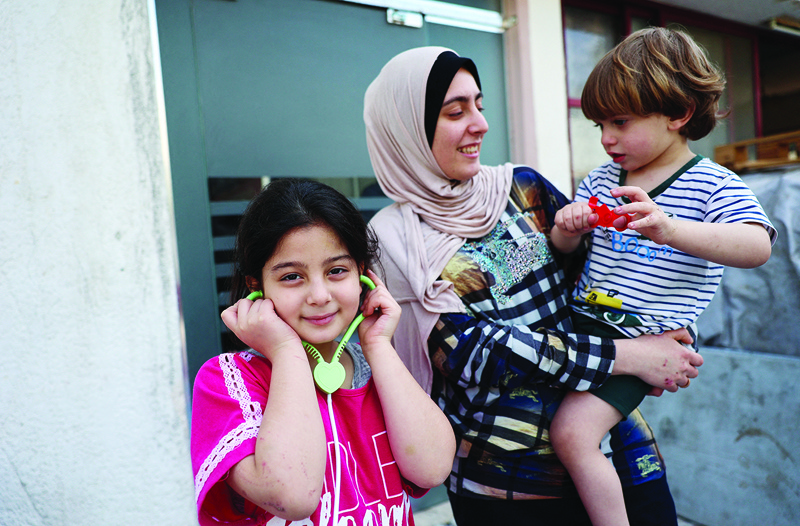 GAZA: Maysa Abu al-Awf plays with her brother Ahmad and sister Maram at their grandfather's home in Gaza City on May 20, 2021, after their home was demolished in a Zionist strike. - AFP
GAZA: Maysa Abu al-Awf plays with her brother Ahmad and sister Maram at their grandfather's home in Gaza City on May 20, 2021, after their home was demolished in a Zionist strike. - AFPGAZA: When a Zionist air strike targeted a security office near her home in Gaza this month, 10-year-old Zeina Dabous frantically scribbled a note and slipped it under her mother's pillow. "Mummy, my love, I am very very scared. If we all die, put us in the same grave all together so I can stay in your arms," she wrote. "I want to wear my Eid clothes," she added, of the outfit she never got to wear for the celebration after Zionist air strikes on the Palestinian enclave started on May 10.
Though a ceasefire has since Friday halted the air raids, experts warn that children in the besieged coastal strip will likely carry the mental scars for years to come. Psychologists say many are showing signs of depression, anxiety, behavioral disorders or irritability, and many are wetting their bed. At home in Gaza City just before the bombing stopped, Zeina said she was constantly petrified and barely sleeping.
"They're always bombing," she told AFP. After a strike hit very close, "before sleeping I wrote a note in red pen to my mother and slipped it under the pillow because I was scared I would die," she said. Zeina is one of around a million children living in Gaza, according to the UN's children agency UNICEF.
Zionist strikes on Gaza killed 248 Palestinians, including 66 children, and have wounded another 1,900 people, the Gaza health ministry says. There is controversy about how many of those killed in Gaza were combatants, and how many were civilians. Zionist Prime Minister Benjamin Netanyahu said the bombing campaign had killed "more than 200 terrorists" in Gaza.
Zionist air strikes also pounded the densely populated enclave in 2008-2009, 2012 and 2014. When the last war raged, Zeina was no older than four. "A whole generation of children has been ravaged by repeated conflicts," said Zeina's grandfather, Saeed Dabous. The charity Save the Children on Friday warned that children in Gaza would suffer for years to come. They "are suffering from fear and anxiety, a lack of sleep, and are displaying worrying signs of distress, such as constant shaking and bedwetting," it said.
In their grandfather's home, Maysa Abu al-Awf, 22, held her two-year-old brother Ahmad on her lap and tried to comfort him after they lost two sisters and dozens of relatives in a devastating air strike. "I'm scared, I'm scared," Ahmad constantly repeated, a scab on his hand and stitches on his bare foot. Maysa said that whenever he heard an explosion, he cried out. "I tell him, 'don't be scared, it's just the sound of balloons popping'."
After air strikes demolished their four-storey family home in Gaza city on Sunday last week, Maysa, little Ahmad and their sister Maram, who is seven, screamed for hours under the rubble before they were rescued. Their two sisters - 20-year-old dentistry student Shaima and 17-year-old school pupil Rawan - did not survive.
Sitting beside her grandfather, Maram shook as she recounted being trapped under the rubble. "I called out for Mummy... I called for them to get me out," she said. At the site of her demolished home, AFP saw Maram's favorite red teddy bear lying in the debris, foam spilling from its left leg. "I am sad," Maram said. "All my books and notebooks were burnt."
In the Gaza Strip's main Shifa Hospital, their 16-year-old cousin Omar was in shock after the same strike killed his two brothers and father, who was the head of internal medicine at the facility. He had stopped talking, his family said. During the Zionist entity's latest military campaign on the coastal strip, which is home to two million people, the Gaza Community Mental Health Program (GCMHP) posted advice for parents on Facebook.
It told them to discuss feelings with their children, but also to try to distract them from the sounds of war with games, drawing or prayers. There is no overall tally of how many children are suffering from mental health issues in Gaza due to repeated conflict, the GCMHP says. But it said it records hundreds of new cases a month.
Psychologist Mohammed Abu Sabeh said children exposed to "great trauma" often then exhibit "violent behavioral disorders". "The wars are sowing violence in schools and homes," he said. Most children in the Gaza Strip suffer from "depression, anxiety or a behavioral disorder", and "a catastrophic number" of them need treatment. "I'm not optimistic," Abu Sabeh said. "This war will create an aggressive, violent and hateful generation." - AFP










